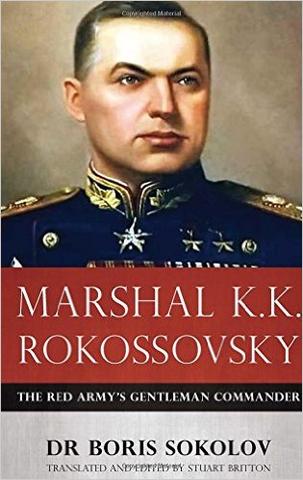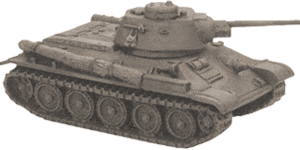Marshal K.K. Rokossovsky

Dr. Boris Sokolov's Marshal K.K. Rokossovsky offers a unique look at not only the life of one of the Red Army's top Second World War era senior officers, but also interesting insight into a Red Army at war. Detailed English language treatments of the Red Army's personnel are rare. For this reason alone this book is an important one for any student of the Second World War. And minus a few oversights the author does a credible job of providing a detailed study of Marshal Rokossovsky.
Sokolov's work is organized into fourteen informative, albeit at times lengthy, chapters beginning with Rokossovsky's youth in Poland and ending with his final years in the late 1960's. The author spends considerable time delving into what made Rokossovsky a widely admired man, and one of the most well respected and beloved commanders in a Red Army that treated it's human capital as a disposable asset. In doing so the book has a secondary benefit of offering budding and current civilian and military leaders alike a tutorial on what effective leadership really means; particularly as contrasted against the far more brutal methods Rokossovsky's peers imposed upon their men to achieve the results they desired. To this end Sokolov draws upon extensive interviews he conducted with Rokossovsky's family members, and the recollections of those that served with him. And though at times this can be a bit too fawning, these interviews nevertheless more than make the author's point that Rokossovsky has to be strongly considered as one of the top three Army and Front level commanders of the Second World War Red Army.
Furthering along that central premise of the book Sokolov illustrates several under-appreciated aspects of some of the Second World War's most critical campaigns. These include during the battles before Moscow, at Stalingrad and Kursk, and Bagration; as well as the fighting in and around Warsaw during the ill-fated uprising late in the summer of 1944. The Warsaw Uprising, and the Red Army's shameful role in failing to assist the Polish Home Army, gets ample treatment. Sokolov provides a detailed analysis of these events from the Red Army's perspective. An analysis that leads him to place the lion's share of blame for the Polish Home Army's comprehensive defeat at the hands of Stalin.
In addition there is much more perceptive analysis in this book. The author seriously addresses the fact that we actually know little that is accurate about the Red Army's losses during several key campaigns in the war; including at Kursk where Dr. Sokolov lays out a strong argument as to why Soviet losses were much more severe than even recent scholarship by the West's foremost historians have led us to believe. Select combat operations also get well-deserved attention in a unique fashion. For instance Sokolov highlights how and why Rokossovsky was able to more easily parry the assualt of Model's Ninth Army at Kursk in July of 1943 while Vatutin struggled much more heavily against Manstein's drive into the southern shoulder of the salient.
In addition the author is not afraid to show the good and the bad of not only Rokossovsky's leadership and his personal life, but the Red Army's failings in conjunction with its victories. A new perspective is provided on the mass rapes and other atrocities committed by the Red Army's final months. The author does not shy away from pointing out the horrors of these war crimes, or the Soviet leadership's responsibility for allowing them to occur on such an overwhelming scale.
This is a book that in spite of at times getting deep into the weeds of battlefield leadership and combat operations is not difficult to follow. The translator Stuart Britton has again done a remarkable job, and his efforts must be commended. Maps and photographs are pertinent and well-done, with the maps clear and easy to follow. Furthermore the nature of Rokossovsky's life means the book is also far more interesting than one might except. Rokossovksy's dual Polish-Soviet background is richly documented. As is the relations with his family members, as well as the difficulties created by the fact that in Russia he was a celebrity (as much as the Stalinist system would allow). The book does not shy away from the affairs of this charismatic and handsome man - including the birth of an illegitimate child to his long time mistress. Beyond those relationships there is also much of interest described in Rokossovsky's complicated relationships with Stalin and Zhukov - the former whom he was loyal to throughout his life in spite of his own brutal imprisonment during the pre-war purges doubtlessly done with Stalin's knowledge.
There is however one glaring omission in this book. That is the lack of footnotes or endnotes. Though the author delved deep into the appropriate archives (see the book's bibliography) and went out of his way to personally speak with those who knew Rokossovsky - the lack of endnotes is a serious oversight that hampers the utility of this work for western researchers. And this criticism in no way is meant to impugn upon the credibility of the author, whose own resume more than speaks for itself.
Overall, Dr. Sokolov has crafted a valuable addition to the existing literature on not just the Second World War, but also many other of the 20th centuries salient events (including insight into post-war Poland and Rokossovsky's role as the Soviet imposed head of the Polish Armed Forces at a critical point during the Cold War). This is a book that those interested in the Soviet Union's history will enjoy.



Post new comment